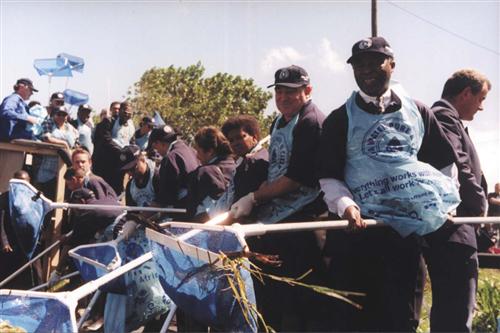Local government plays a pivotal role in river basin management, as it often located closest to water resource management "actions" and is in a good position to assess and effectively articulate national government policies and convey sentiments of local people back up to national government and the river basin organisation. Local government is also best able to develop regulations that address issues in its jurisdiction, and be able to effectively monitor implementation and adherence.
However, challenges arise in situations where the river basin falls within more than one political administrative zone. In such cases, each local government structure may try to advance its own agenda to the detriment of others. Existing administrative divisions and regulatory conditions might discourage the management of water according to river basin boundaries. River Basin Organisations should be at the foundation of effective river basin planning, development and management. River basin agencies cannot in themselves ensure the sustainable development of the resource. They need support from a range of institutions that help determine the demands placed on the resource by economic, social and political change.
While devolution of responsibilities to local governments should help ensure that service delivery is more attuned to consumer priorities, and that providers are more accountable for their actions, several important issues are raised by devolution (GWP 2000):
-
"To achieve efficiency it is important to distance the provider from short-term political interference
-
The finances of the provider need to be clearly differentiated from the general accounts of the local government unit
-
To minimise the danger of poor-governance, performance monitoring, benchmarking and some aspects of regulation may be more appropriately entrusted to a higher tier of government or some independent agency
-
Institutions are needed to ensure that local providers cannot ignore the effects of their actions on downstream water users or other stakeholders in the river basin or catchment
-
Provision of co-ordination mechanisms may be necessary if the boundaries of local governments fail to cover all customers or if more than one local authority exists in an area
-
Small municipalities may need to consolidate their water service facilities or activities in order to fully realise economies of scale and scope
-
It is important that local government recognises that land use planning, economic development and social policies can all have a profound effect on water demand and the production of waterborne waste"
Local Government – Orange-Senqu Basin States
In Botswana, the Ministry of Local Government and Lands (MLGL) has responsibility for water supply to the rural villages through the District Councils (ORASECOM 2007j). In practice, this occurs with significant support from the DWA. The MLGL is also responsible for land use planning, environmental investigations and the preparation of the National Conservation Strategy.
In Lesotho, the Local Government Act (1997) provides for local government structures to eventually deliver water services, but this is still a long way from implementation (ORASECOM 2007j). Some local institutions are operational: the Water and Sewage Authority, the Lesotho Lowlands Project Unit, and the Lesotho Highlands Development Authority. The new Lesotho Water and Sanitation Policy of 2007 emphasises the importance of stakeholder involvement and the devolution of certain water management activities to local councils and sub-committees.
Local government in Namibia provides support to community-based water management, linked to the Directorate of Rural Water Supply (DRWS) of the Department of Water Affairs (DWA) in the Ministry of Agriculture, Water and Forestry through the Ministry of Regional, Local Government and Housing and Rural Development (ORASECOM 2007j). Local government is also involved in bulk water supply through NamWater.
In South Africa, there is an on-going devolution of responsibilities, in the context of the NWA and NWRS, from national to local government and community-based organisations (ORASECOM 2007j). Catchment Management Agencies are being established, and at the local level Water User Associations and Water Service Authorities are being set up.

Former President Thabo Mbeki and former Minister of Water Affairs and Forestry, Ronnie Kassrils getting involved in a river clean-up activity, part of the Working for Water Programme.
Source:DWAF South Africa 2000
( click to enlarge )
